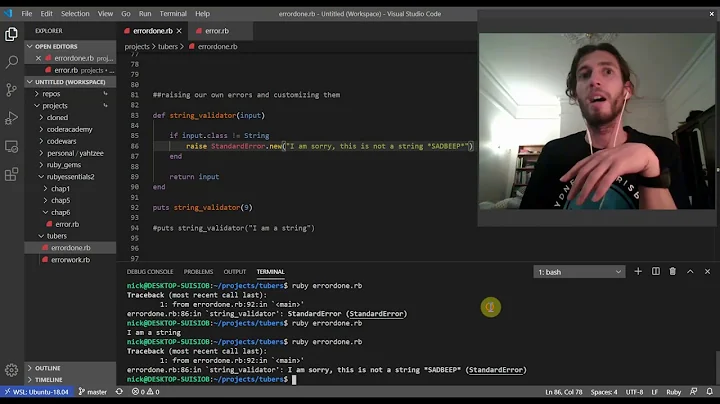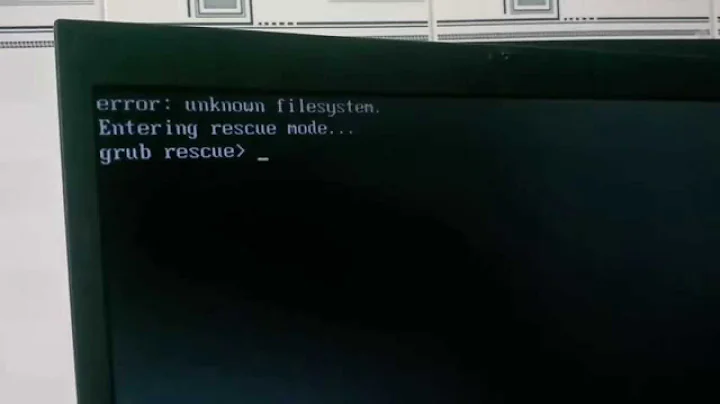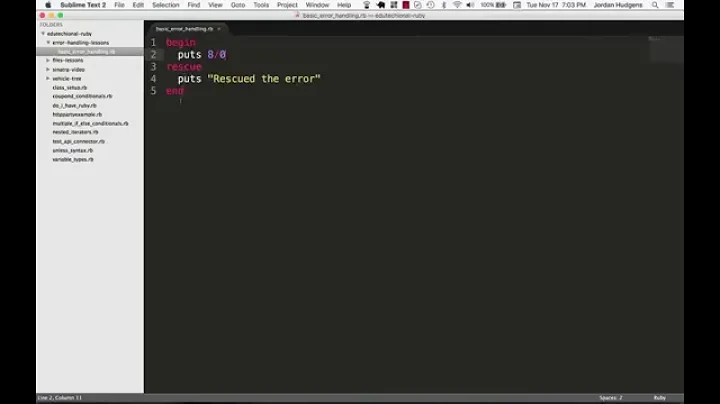Passing multiple error classes to ruby's rescue clause in a DRY fashion
Solution 1
You can use an array with the splat operator *.
EXCEPTIONS = [FooException, BarException]
begin
a = rand
if a > 0.5
raise FooException
else
raise BarException
end
rescue *EXCEPTIONS
puts "rescued!"
end
If you are going to use a constant for the array as above (with EXCEPTIONS), note that you cannot define it within a definition, and also if you define it in some other class, you have to refer to it with its namespace. Actually, it does not have to be a constant.
Splat Operator
The splat operator * "unpacks" an array in its position so that
rescue *EXCEPTIONS
means the same as
rescue FooException, BarException
You can also use it within an array literal as
[BazException, *EXCEPTIONS, BangExcepion]
which is the same as
[BazException, FooException, BarException, BangExcepion]
or in an argument position
method(BazException, *EXCEPTIONS, BangExcepion)
which means
method(BazException, FooException, BarException, BangExcepion)
[] expands to vacuity:
[a, *[], b] # => [a, b]
One difference between ruby 1.8 and ruby 1.9 is with nil.
[a, *nil, b] # => [a, b] (ruby 1.9)
[a, *nil, b] # => [a, nil, b] (ruby 1.8)
Be careful with objects on which to_a is defined, as to_a will be applied in such cases:
[a, *{k: :v}, b] # => [a, [:k, :v], b]
With other types of objects, it returns itself.
[1, *2, 3] # => [1, 2, 3]
Solution 2
Edit / Update
I missed the whole point of the original question.
While the accepted answer is a valid one, in my opinion it's not a good practice to use the suggested technique. One can always have a wrapping function with the desired (and generic) try/rescue.
While the answer given by @sawa is technically right, I think it misuses Ruby's exception handling mechanism.
As the comment by Peter Ehrlich suggests (by pointing to an old blog post by Mike Ferrier), Ruby is already equipped with a DRY exception handler mechanism:
puts 'starting up'
begin
case rand(3)
when 0
([] + '')
when 1
(foo)
when 2
(3 / 0)
end
rescue TypeError, NameError => e
puts "oops: #{e.message}"
rescue Exception => e
puts "ouch, #{e}"
end
puts 'done'
By using this technique, we can access the exception object, which usually has some valuable information in it.
Solution 3
I just ran into this issue and found an alternate solution. In the case your FooException and BarException are all going to be custom exception classes and particularly if they are all thematically related, you can structure your inheritance hierarchy such that they will all inherit from the same parent class and then rescue only the parent class.
For example I had three exceptions: FileNamesMissingError,InputFileMissingError, and OutputDirectoryError that I wanted to rescue with one statement. I made another exception class called FileLoadError and then set up the above three exceptions to inherit from it. I then rescued only FileLoadError.
Like this:
class FileLoadError < StandardError
end
class FileNamesMissingError < FileLoadError
end
class InputFileMissingError < FileLoadError
end
class OutputDirectoryError < FileLoadError
end
[FileNamesMissingError,
InputFileMissingError,
OutputDirectoryError].each do |error|
begin
raise error
rescue FileLoadError => e
puts "Rescuing #{e.class}."
end
end
Related videos on Youtube
Comments
-
 apb almost 2 years
apb almost 2 yearsI have some code that needs to rescue multiple types of exceptions in ruby:
begin a = rand if a > 0.5 raise FooException else raise BarException end rescue FooException, BarException puts "rescued!" endWhat I'd like to do is somehow store the list of exception types that I want to rescue somewhere and pass those types to the rescue clause:
EXCEPTIONS = [FooException, BarException]and then:
rescue EXCEPTIONSIs this even possible, and is it possible without some really hack-y calls to
eval? I'm not hopeful given that I'm seeingTypeError: class or module required for rescue clausewhen I attempt the above.-
Roman about 13 yearsWhat about rescue *EXCEPTIONS ?
-
-
 apb about 13 yearsThis appears to work even in ruby 1.8.7. What is the term for using the '*' character in front of
apb about 13 yearsThis appears to work even in ruby 1.8.7. What is the term for using the '*' character in front ofEXCEPTIONSin this case? Would like to learn a bit more. -
 sawa about 13 years@Andy It's called splat. It usually has the effect of decomposing an array into comma separated objects. When used in the argument receiving position of a method definition, it does the other way: put the arguments together into an array. It's quite useful in various occasions. Good to know that it works with 1.8.7. I edited my answer accordingly.
sawa about 13 years@Andy It's called splat. It usually has the effect of decomposing an array into comma separated objects. When used in the argument receiving position of a method definition, it does the other way: put the arguments together into an array. It's quite useful in various occasions. Good to know that it works with 1.8.7. I edited my answer accordingly. -
Peter Ehrlich over 11 yearsNote that if you want to access the exception instance, use this syntax:
rescue InvalidRequestError, CardError => e(see mikeferrier.com/2012/05/19/…) -
 William S about 4 yearsThis syntax works just fine:
William S about 4 yearsThis syntax works just fine:rescue *EXCEPTIONS => e, whereEXCEPTIONSis an array of exception class names. -
 Segfault about 3 years-1 This is the syntax OP has in his question. He wants to extract that list into a place where it is easier to maintain, I assume because the same list of exception types has to be repeated in multiple places and updates to the list have been error prone.
Segfault about 3 years-1 This is the syntax OP has in his question. He wants to extract that list into a place where it is easier to maintain, I assume because the same list of exception types has to be repeated in multiple places and updates to the list have been error prone. -
Ron Klein about 3 years@Segfault only after reading your comment I finally understood OP's question..










